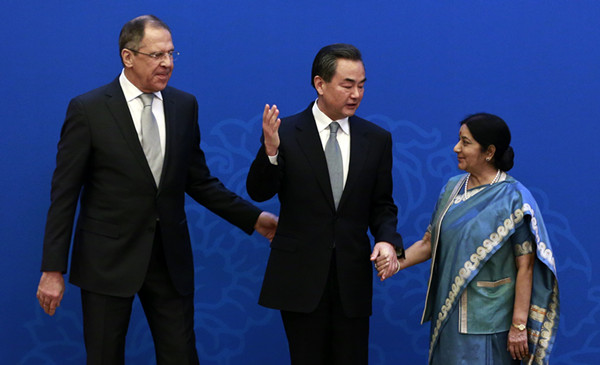New system set up for Asia-Pacific region
 0 Comment(s)
0 Comment(s) Print
Print E-mail China Daily, February 3, 2015
E-mail China Daily, February 3, 2015
China, Russia and India decided to set up a consultation mechanism for Asia-Pacific affairs on Monday, with their foreign ministers calling for the first round of talks on the mechanism to be held soon.
Their call was issued in a joint declaration after the three-way meeting in Beijing, which followed US President Barack Obama's high-profile visit to India last week.
And in a rare meeting with a visiting Indian foreign minister on Monday, President Xi Jinping relayed encouraging signals.
Differences should be approached patiently and not affect overall ties, to allow the gradual settlement of related issues, Xi told Indian External Affairs Minister Sushma Swaraj.
"I have full confidence in the future of China-India relations and I believe that progress will be achieved in growing this bilateral relationship in the new year," he said.
Swaraj also adopted an encouraging tone. She called for both countries to handle the border issue properly and for more Chinese investment.
Observers said the rare consultation mechanism will focus on the coordination of issues in the Asia-Pacific region, whose structure is at the core of their shared interests.
Foreign Minister Wang Yi said at a news conference, "As nations in this region, the three countries have realized it is a great responsibility and obligation to maintain stability and seek common progress when old and new mechanisms coexist in the region."
Obama's visit to India has been seen as an attempt to deepen US influence in Asia-Pacific by strengthening ties with countries on China's periphery.
The visit also came amid Western sanctions imposed on Russia over the Ukraine crisis and as the Russian economy was hit by steep falls in the rouble.
Sun Shihai, director of the Chinese Association for South Asian Studies, said the three countries are seeking to rely on and support each other in boosting their global impact.
The Asia-Pacific is a global economic engine, and there is great potential to be tapped out from the trilateral cooperation, Sun said.
Ye Hailin, a researcher of South-Asian studies at the Chinese Academy of Social Sciences, said the three countries have differing views on the region's future and each other's role.
Ma Jun, a researcher of Indian studies at the Academy of Military Science under the People's Liberation Army, said India, with fast economic development, has been especially active in seeking a bigger role in regional affairs.
China is India's top trading partner, but mutual suspicion still hangs over ties, in large part a legacy of a brief conflict in 1962.
Such suspicion flared again during Obama's visit to India, during which the two sides referred to the South China Sea issue, in a veiled reference to China.







Go to Forum >>0 Comment(s)